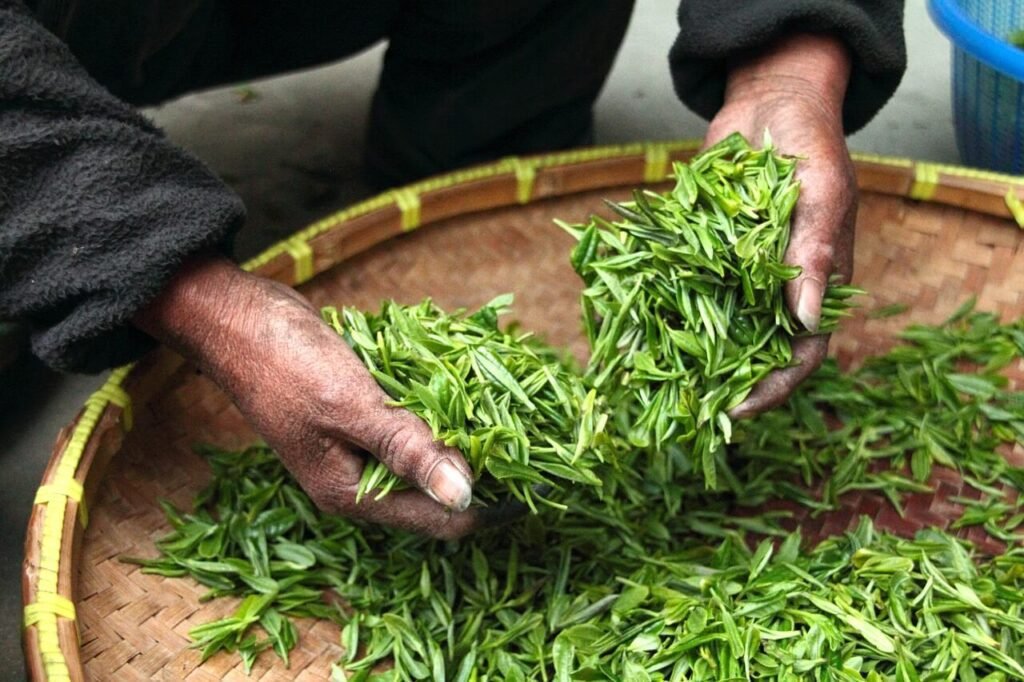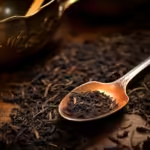Table of Contents
Tea is a beloved beverage worldwide. It’s cherished not only for its variety of flavors but also for its health benefits.
Among the many types of tea, black tea vs green tea is a particularly popular comparison. They both come from the same plant, Camellia sinensis, but differ in taste, color, and more.
The key difference lies in the processing of the leaves. Black tea undergoes full oxidation, giving it a darker color and richer flavor. On the other hand, green tea is not oxidized, resulting in a lighter color and more delicate taste.
Another significant difference is their caffeine content. Black tea typically contains more caffeine than green tea. This difference can influence your choice depending on your caffeine sensitivity or preference.
Both teas offer a range of health benefits due to their antioxidant properties. However, the types of antioxidants and their concentrations vary between the two.
The flavors of these teas also differ. Black tea is often described as bold and robust, while green tea flavors can range from grassy to sweet.
This article will delve into these differences in detail. It aims to provide a comprehensive comparison to help you make an informed choice between black and green tea.
Understanding the Basics: Origins and Processing
Tea’s journey begins with the Camellia sinensis plant. This single plant produces a variety of teas, including both black and green.
The processing methods create the distinction between these two popular tea types. Oxidation is key in transforming the leaves into black or green tea.
Black tea undergoes a full oxidation process. This gives it its characteristic dark color and robust flavor profile.
Green tea skips the oxidation step altogether. This preserves its natural green color and more delicate taste.
The differences in processing also affect the health benefits offered by each tea type. These processes influence their antioxidant levels and flavor variety.
Understanding these basics helps in making informed choices. Whether you prefer a bold flavor or a light taste, the processing makes a difference.
Origins of Tea: Camellia Sinensis
Both black and green tea originate from the Camellia sinensis plant. This evergreen shrub thrives in tropical and subtropical climates.
The tea plant is native to East Asia. It’s now cultivated worldwide in regions with suitable weather conditions.
Depending on climate and soil, the flavor and quality of the tea vary. Famous tea regions include China, India, and Japan, known for their unique tea varieties.
Processing: Oxidation and Its Impact
Oxidation is a crucial step in tea processing. It involves exposing the tea leaves to air, which alters their chemical composition.
Black tea‘s full oxidation gives it a dark hue. It also imparts a richer, malty taste and higher caffeine content compared to green tea.
In contrast, green tea is minimally processed. The leaves are quickly dried or steamed to prevent oxidation, preserving their lighter color and fresh flavor.
These processing differences also influence antioxidant levels. Black tea contains theaflavins, while green tea is high in catechins. Each offers unique health benefits.
Caffeine Content: Green vs Black Tea Caffeine
Caffeine content is a major consideration for many tea drinkers. Both black tea and green tea contain caffeine, but in different amounts.
On average, black tea contains more caffeine compared to green tea. This difference can be significant depending on how the tea is processed and brewed.
The caffeine content in tea can also vary due to factors like leaf age and brewing time. Let’s delve into how these levels differ and what that means for tea enthusiasts.
Tea drinkers often choose their tea based on desired caffeine effects. Understanding these differences can help in selecting the right tea for each situation.
Here’s a quick breakdown of caffeine content:
- Black Tea: 40-70 mg of caffeine per cup
- Green Tea: 20-45 mg of caffeine per cup
- These values can fluctuate based on preparation and brand.
How Caffeine Levels Differ
Black tea typically has a higher caffeine content due to its full oxidation process. The oxidation not only changes the flavor but also the chemical composition.
Green tea’s reduced processing helps retain lower caffeine levels. It’s often seen as a gentler option for those sensitive to caffeine.
The harvested leaves’ maturation also plays a part. Older leaves generally contain more caffeine, affecting the final brew.
Brewing time further impacts caffeine extraction. Longer steeping increases the caffeine concentration for both tea types.
Ultimately, the processing and preparation of the tea determine its caffeine level. Consumers should consider how these elements align with their caffeine needs.
Choosing Based on Caffeine Sensitivity
For those who are caffeine-sensitive, green tea usually offers a milder option. Its lower caffeine content makes it a popular choice later in the day.
Black tea, with its robust caffeine levels, suits those seeking an energy boost. It’s often chosen for morning or early afternoon consumption.
Understanding your caffeine tolerance can guide your tea selection. Consider your daily routine and energy needs when deciding between black and green tea.
Flavor Profiles: Exploring Tea Flavors

The diversity in tea flavors is vast and enchanting. Each tea type offers a unique taste that captivates different palates.
Flavors in tea develop through processing, the region they come from, and even the time of year they’re harvested. Tea lovers can explore the broad spectrum of tastes from bold and strong to subtle and sweet.
One can choose tea flavors based on their mood or the occasion. From the robust notes in black tea to the delicate aroma of green tea, there’s much to experience.
Here’s a brief overview of flavor profiles:
- Black Tea: Bold, malty, and sometimes fruity or floral.
- Green Tea: Grassy, vegetal, with sweet or floral undertones.
The exploration of tea is a delightful journey of discovering which flavors resonate most with you.
Black Tea Flavors
Black tea offers a bold taste that often carries malty and robust notes. Its full-bodied character is a favorite for many tea aficionados.
The oxidation process brings out rich flavors that may include hints of fruit or subtle floral notes. Each cup can deliver a unique experience based on its origin.
Popular black tea varieties, such as Assam or Darjeeling, are known for their distinct tastes. These flavors can be further enhanced with additions like milk or sugar.
Western cultures often enjoy these rich flavors by blending them into classic teas like Earl Grey. Their versatility makes black tea a staple in many households.
Green Tea Flavors
Green tea is celebrated for its lighter, more refreshing taste. It often has a grassy or vegetal flavor profile, appealing to those who prefer subtlety in their beverage.
Beyond its core taste, some green teas offer sweet or floral undertones. These gentle flavors make it a versatile tea, suitable for various brewing methods and pairings.
Sencha and Matcha, popular green tea types, showcase these unique flavors exceptionally well. They offer different experiences from light infusions to richer, fuller expressions.
Green tea is often savored plain, allowing the natural flavors to be fully appreciated. Its flexibility as a beverage makes it a favorite among tea enthusiasts seeking a healthful option.
East Asian cultures traditionally drink green tea to celebrate its delicate balance of sweetness and freshness. Its varied flavors continue to intrigue tea lovers worldwide.
Health Benefits: Antioxidants and Beyond
Tea has long been cherished not just for its flavors but also for its health benefits. Both black and green teas are rich in antioxidants, which play a crucial role in promoting health.
Antioxidants help neutralize free radicals in the body, reducing oxidative stress. This process can offer protection against chronic diseases.
Tea consumption is linked to a lower risk of certain health conditions, making it a valuable addition to a balanced diet. Tea enthusiasts appreciate these benefits while enjoying their daily brew.
Antioxidant Properties of Green Tea
Green tea shines with its high content of catechins, a type of antioxidant. Catechins, particularly EGCG (epigallocatechin gallate), have been studied for their health-promoting properties.
Research suggests that green tea may support weight loss by boosting metabolism. It’s also associated with reduced inflammation and better brain function.
Additionally, green tea’s antioxidants can help protect the skin from damage, promoting healthier, more youthful skin. These attributes make it a popular choice among health-conscious individuals.
Health Contributions of Black Tea
Black tea is abundant in theaflavins and thearubigins, antioxidants that offer various health advantages. These compounds contribute to heart health by potentially improving cholesterol levels.
Studies also suggest black tea might support gut health by promoting beneficial bacteria growth. This can lead to improvements in digestive wellness.
Moreover, black tea has shown potential anti-cancer properties through its antioxidant action. While research is ongoing, black tea continues to be valued for its positive impact on overall well-being.
Brewing Techniques: Maximizing Flavor and Benefits
The way you brew your tea can significantly impact its taste and health benefits. Proper brewing techniques ensure that you extract the maximum goodness from each cup. Both black and green teas have specific requirements for temperature and steeping time.
To achieve the ideal brew, consider the following tips:
- Use fresh, quality tea leaves for the best flavor.
- Measure the right amount of tea per cup.
- Adjust steeping time based on tea type and personal preference.
- Use filtered water to enhance flavor.
These simple steps can enhance your tea experience and help you enjoy the full range of flavors and benefits they offer.
Best Practices for Brewing Green Tea
Green tea is best brewed at a lower temperature than black tea. Water temperature should be between 150°F and 180°F. Boiling water can scorch the delicate leaves, resulting in bitterness.
Steeping time is crucial for green tea. Aim for 1 to 3 minutes to retain its delicate flavor. Experiment with time and temperature to find your perfect cup.
Best Practices for Brewing Black Tea
Black tea requires a hotter brewing process. Boil water to about 200°F to 212°F for optimal extraction. This temperature helps release the tea’s robust flavors.
For steeping, three to five minutes is ideal. Longer steeping can lead to a stronger, more astringent taste. Adjust based on how bold you like your tea, always keeping flavor balance in mind.
Cultural Significance and Consumption Habits

Tea is more than just a drink; it holds cultural importance worldwide. Both black and green teas play key roles in different traditions and social settings. Understanding these roles enhances our appreciation of tea’s rich history.
Consumption habits vary widely across cultures. In some places, tea serves as a communal activity. In others, it’s a solitary indulgence. The way tea is served, consumed, and valued reflects local customs and preferences.
Notably, these cultural practices have evolved over centuries, influenced by historical trade routes and colonialism. Such shifts have enriched the global tea culture. With diverse ceremonies and rituals, tea continues to connect communities today.
Key aspects of tea culture include:
- Rituals and ceremonies, like the Japanese tea ceremony.
- Social gatherings, where tea fosters conversation and connection.
- Health and wellness trends, integrating tea into modern lifestyles.
Black Tea in Western and Eastern Cultures
In Western cultures, black tea is often the go-to choice. It’s commonly enjoyed with milk and sugar, especially in the UK. Popular blends like Earl Grey and English Breakfast are staples in many households.
Eastern cultures, particularly in India and China, also value black tea. However, it’s often consumed plain. Regions like Assam and Darjeeling produce world-renowned black teas that contribute to cultural rituals and daily life.
Green Tea Traditions Around the World
Green tea holds a prominent place in East Asian cultures. Japan, in particular, celebrates green tea through elaborate tea ceremonies. These rituals emphasize mindfulness and aesthetics.
In China, green tea is a staple in daily life, praised for its health benefits. The preparation and serving of green tea often reflect centuries-old traditions. Globally, green tea has gained popularity as part of health-conscious lifestyles, noted for its antioxidant properties.
Sustainability and Ethical Considerations
Sustainability in tea production is gaining attention worldwide. With climate change affecting growing regions, sustainable practices are crucial. They ensure the future of tea farming while protecting the environment.
Ethically sourced tea is another consideration for conscious consumers. Certifications help assure that workers are treated fairly. They also indicate that the production methods meet certain environmental standards.
Consumers can look for specific labels when purchasing tea. These labels represent:
- Fair Trade
- Rainforest Alliance
- Organic certification
Choosing certified tea supports ethical and sustainable practices. This conscious choice contributes to a healthier planet and better working conditions in the tea industry.
The Importance of Sustainable Tea Farming
Sustainable tea farming involves methods that minimize environmental impact. It includes responsible water use and soil conservation. Sustainable practices also focus on maintaining biodiversity within tea gardens.
These practices help reduce carbon footprints. They ensure a stable future for tea cultivation amidst climate challenges. Farmers adopting these methods contribute to the long-term viability of tea production.
Ethical Sourcing and Certifications
Ethical sourcing focuses on fair treatment of workers. It ensures fair wages and safe working conditions. Certifications help verify that these standards are met.
Key certifications such as Fair Trade and Rainforest Alliance indicate ethical sourcing. They reassure consumers about the social and environmental impacts of their purchases. Supporting certified products helps promote positive change in the tea industry.
Conclusion: Personal Preferences and Tea Differences Exploration
Choosing between black tea vs green tea depends on individual tastes and health goals. Each tea offers unique flavors, caffeine levels, and benefits. Understanding these differences helps you make informed choices.
Experimenting with both types can lead to delightful discoveries. Whether you prefer the boldness of black tea or the subtlety of green tea, exploration is key. Enjoy the journey of finding your perfect cup.
Summary of Key Differences
Black tea is bold with higher caffeine, while green tea is delicate and lower in caffeine. Each offers distinct health benefits.
Encouraging Personal Discovery
Sample various blends and types to find your favorite. Enjoy exploring the rich world of teas and uncover what suits your taste and lifestyle.













